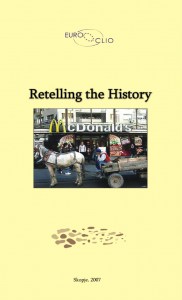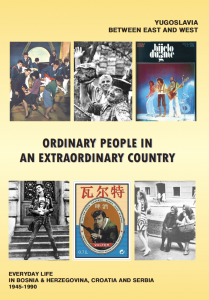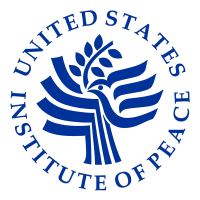Many historians are afraid to teach young people in school about the recent past. However, if school does not address such issues, it will be left to the street, the family, and the peer group to deal with this often sensitive past. It is therefore that the project Macedonia, Retelling the History has decided to focus on history lessons addressing the short history of the Macedonian Independence, placed within the multiethnic setting of the country.
On Wednesday 21 November Retelling the History, a publication in Albanian, Macedonian and English has been presented in the Institute for Macedonian Language, Krste Misirkov within the framework of the International Conference History, Historiography and History Teaching, organised for the 55th Anniversary of AHRM the Association of Historians of the Republic of Macedonia. The publication is the result of the project Macedonia: Retelling the History, a one year common project between the AHRM, and EuroClio, the European History Educators Association, funded by the United States Institute of Peace.
The project aimed to address four urgent demands in the Macedonian Learning and Teaching of History: the innovation of the traditional content of twentieth century Macedonian history, the development of creative and active methodology, the insertion of diversity in narratives and perspectives and an adaptation to the multicultural environment of present day Macedonia. The AHRM in close cooperation with their EuroClio counterparts wishes with this project to empower Macedonian history and citizenship educators with the creation of practical, active teaching materials which acknowledges diversity in modern Macedonia.
Project Aims
[su_list icon=”icon: caret-right”]
- Support innovative and responsible curriculum approaches to teaching 20th century history in Macedonian that stimulates peace, diversity and understanding in society, through capacity building among a cross-cultural/multiethnic group of historians and history educators
- Produce teaching materials related to the twentieth century history of Macedonia, available in the medium of Macedonian or Albanian languages, as an aid to teachers willing to reduce interethnic conflict and tension. These teaching materials are based on collaborative writing and promote multi-perspectivity in history, recognizing that national stories are complex and that considering variety in narratives and interpretations is enriching and empowering
- Creation of a teaching tool that blends knowledge, understanding, concepts and key and transversal competencies Reinforce divers and active teaching and learning styles
Results
[su_list icon=”icon: caret-right”]
Main Results:
- Evidence that it is possible to teach engaging Macedonian history from a variety of perspective, giving voice to different communities in its society
- Retelling the History, an alterative Curriculum for 20th century history and four exemplar lessons on Independent Macedonia, products of collective writing, and based on key questions, sources, concepts and key and transversal competencies.
- A small interethnic group received intensive and high quality professional capacity building in Macedonia and abroad
- The project strengthened the independent, multiethnic and democratic History Educators Association of Macedonia (ANIM), also in entrepreneurial and management competencies
- The project increased the regional and international network of the Macedonian history professionals, with focus on Bosnia, Bulgaria, Croatia and Serbia
Press:
The TV-show, Without Pardon, that featured Besnik Emin and Todor Cepreganov, two of the project team members, about History Textbooks in Schools with direct phone calls into the show. Joke van der Leeuw and Clio Stronk, Article in Kleio.
External Review:
The external reviewer Prof. Keith Barton expressed following observations about the project:
“Co-operative, teacher-led writing groups, equally involving the two principal language groups, have been at the core of this project. Project participants clearly demonstrate a commitment to the quality and success of the project, and they have worked well together’.
‘Project participants have systematically concerned themselves with creating materials at an appropriate reading level, and they have developed activities that will engage students in constructing their own understanding of the country’s recent history. As a result, this curriculum does not promote separation but rather leads to an understanding of similarities and differences among groups.
The full external review by Prof. Keith Barton can be found here: External Evaluation Keith Barton-EN
[/su_list]Legacy
[su_list icon=”icon: caret-right”]
The project showed the potential for a cross-community approach for the learning and teaching of history, however its impact could only limited due to the small size of the project and the partial support from the educational authorities. Since 2007 the History Educators Association of Macedonia (ANIM) tries to convince national authorities as well as international donors to increase the impact. In 2011 the project History that Connects – How to Teach Sensitive Topics in Macedonia was granted to Macedonia.
Project Leader Mire Mladenovski played an essential role in the EuroClio project History in Action – Planning for the Future (2005-2008) , culminating in the editing process of the following developed Teaching Tool, available online in English, Bosnian, Croatian, and Serbian:
ANIM became also full project partner in the EuroClio Project History that Connects, (2011-2014) involving History Educators Associations from all Former Yugoslav Countries.
[/su_list]Contributors
Local Coordinator: Mire Mladenovski.
Local project experts: Todor Cepreganov, Iljo Trajkovski, Ljupka Hristova, Katerina Todoroska, Valentina Stamenkovic, Isamedin Azizi, Besnik Emini, Behar Mehmeti, Kenan Iseni, Harun Rexhepi.
International project experts: Dean Smart, Keith Barton.
Project Managers
Joke van der Leeuw-Roord, EuroClio Executive Director




